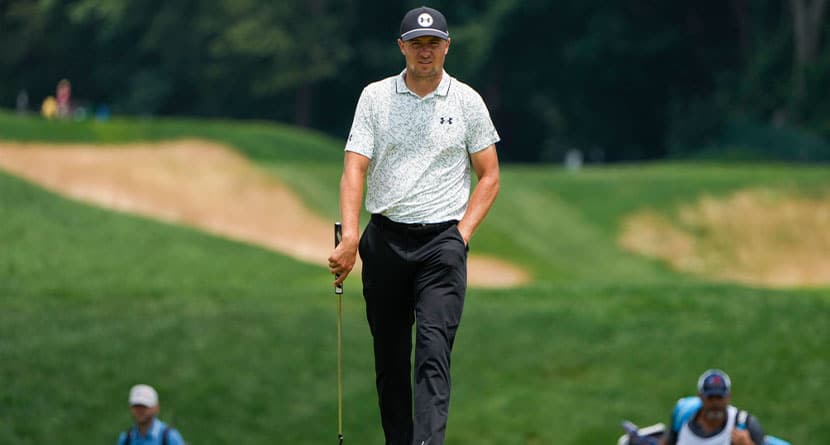Jordan Spieth returns to the John Deere Classic for the first time since he won a playoff in 2015. Just don’t get the idea this is some kind of nostalgia tour.
He needs the points.
Spieth started the year guaranteed starts in all eight of the PGA Tour’s signature events and finished third at Kapalua in the first one. But he has plunged all the way to No. 59 as he works through a wrist injury and at times has played practice rounds while on the phone for one of many meetings as a PGA Tour board member.
Time is running out. Five tournament weeks remain before the postseason, and while the top 70 advance to the FedEx Cup playoffs, the magic number is 50. That guarantees a spot in next year’s signature events with their $20 million purses and elevated points.
That’s the easier path. It doesn’t mean it’s easy.
Spieth is among 15 players who started the year with the advantage of playing all the signature events and now are outside the top 50 heading into the home stretch. One of those was Tyrrell Hatton, who really took the easy path by joining Saudi-funded LIV Golf with its no-cut $20 million events.
Rickie Fowler at No. 93 is in the lowest spot of those 14 players still on the PGA Tour. He is one year and one week removed from his Rocket Mortgage Classic victory. Since then, his best finish is 16th at the Tour Championship. In the signature events, his best is a tie for 18th in the RBC Heritage.
It’s a reminder that in this era of massive change on the PGA Tour — more money for fewer players — performance still matters.
There was so much hand-wringing about pandering to the stars last year that not enough attention was paid to Justin Thomas and Adam Schenk. One was a 15-time PGA Tour winner who had a stinker of a year and missed the playoffs. The other was a journeyman who cashed in at the right time and earned his way to the Tour Championship.
Thomas did well enough for so long that he didn’t fall far, and his world ranking in the top 30 got him into the signature events. He had top 12s in four of those events, along with a strong finish in The American Express and the PGA Championship, so he is No. 16 in the FedEx Cup.
Fowler is this year’s version of Thomas, minus the world ranking, although it’s not too early to speculate whether he will get some of the exemptions that went to Webb Simpson next year if he doesn’t turn it around quickly.
This year’s Schenk? Eight players outside the top 50 in the FedEx Cup last year have won tournaments, a list ranging from Taylor Pendrith to Stephan Jaeger. Two players currently inside the top 30 got there without winning — Christiaan Bezuidenhout and Thomas Detry.
Another example is former FedEx Cup champion Billy Horschel, who had no guarantee of signature events after a poor 2023 season. He won in the Dominican Republic. He had a pair of top 10s in regular PGA Tour events and a tie for eighth in the PGA Championship. Horschel got into one signature event based on his win, two others on an exemption. He took advantage only at the Memorial with a tie for 15th.
Horschel, 90th in the FedEx Cup a year ago, is at No. 46 and plans to play the final four tournaments on the schedule starting next week at the Scottish Open.
“These signature events are great for a multitude of reasons,” Horschel said. “But if you don’t play well, you’re behind the eight ball. And with the shorter season, we all knew it was going to be a sprint.”
Those events can go a long way, though. Sungjae Im is an example of that. The South Korean has three top 5s this year, all of them in signature events. That’s 60% of his points from three of the 18 tournaments he has played this year.
The system is not perfect.
Horschel was among those who realized immediately that winning a tournament — which should include the best perks — counts toward the “swing” list of 10 and five players who get into signature events, instead of a separate entry category. A few extra players in signature events isn’t going to hurt. Some tweaks are expected for next year.
His greater concern is Korn Ferry Tour graduates — the new blood each season — having enough access. None is among the top 70 at the moment, and only five are in the top 100. The further down the list of their priority ranking, the fewer the starts.
And that’s an indication that top-50 players aren’t just cherry-picking the signature events. Masters champion Scottie Scheffler has played four regular PGA Tour events, while PGA champion Xander Schauffele has played three.
Fewer fully exempt cards might be one solution. The PGA Tour must strike a balance of providing playing opportunities with creating tournaments with the best fields while keeping a path open for the next generation.
This isn’t a finished product. What hasn’t changed is good golf can go a long way.




